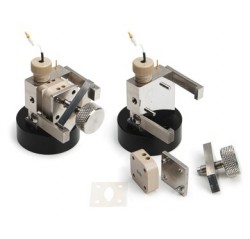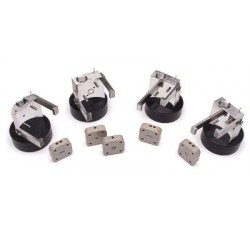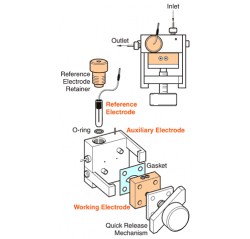Cela przepływowa (do HPLC)


 Elektrochemiczne cele przepływowe. Mogą być stosowane w detektorach elektrochemicznych do HPLC.
Elektrochemiczne cele przepływowe. Mogą być stosowane w detektorach elektrochemicznych do HPLC.
Więcej informacji
An electrochemical detection flow cell consists of a working electrode, an auxiliary electrode, and a reference electrode. These work together with the electrochemical detector to apply a controlled potential for your sample to flow across, and be oxidized or reduced. The electrochemically active surface of the working electrode may be glassy carbon, copper, gold, nickel, platinum, copper, or mercury/silver.
The actual electrochemically active surface(s) in a working electrode are the centrally located “dots” in the working electrode block, as illustrated below. In some cases there may be multiple working electrodes within a working electrode block. With multiple surfaces you can further optimize the detection of multiple analytes via dual or quad electrochemical detection.
To maximize your flexibility, BASi has developed a variety of electrochemical detector working and auxiliary electrodes suited for a multitude of flow cell applications. While there are several options, usually, choosing which is optimal for your analyses is usually fairly straight-forward.
To begin, in most cases, the analyte(s) of interest determines the working electrode material. For most oxidizable or reducible organic compounds, a glassy carbon electrode is used. For acetylcholine, either a platinum or “wired” glassy carbon is used (since enzymatic derivatization yields detectable H2O2). Hg/Au is used to determine thiols/disulfides, a copper electrode for carbohydrates, and gold is used for pulsed electrochemical detection (PAD) techniques. If you are not sure which electrode will be optimal for your application, we would be delighted to assist; call or email BASi and we can discuss detection of your analyte.
A second deciding factor, is whether the HPLC column is standard bore size or microbore. In many instances an electrochemical cell used for standard chromatography can be optimized for a microbore system by the simple change of flowcell gasket thickness, thus reducing the cell-swept-volume.
Third, several electrochemical cell flow patterns are available. Either a “cross-flow” or “radial-flow” cell will usually give you the optimal response, thus resulting in lower detection limits. Generally radial-flow cells are best suited for microbore electrochemical detection systems and cross-flow for standard bore chromatography systems. If post-column fraction collection or connection to a second detector (UV, fluorescence, or MS) is required, then the cross-flow with reference port configuration (MF-1092) should be used.
The following sections describe a number of options. Call or emailBASi if it is not clear which cell best fits your system/application.
A complete flowcell consists of two separate BASi part numbers, one for the Auxiliary Electrode, the other for a Cell Kit.
- The Auxiliary Electrode includes a phenolic base, arms, and exit ports.
- The Cell Kit includes a glassy carbon working electrode, gasket, reference electrodes, the retaining hardware for these electrodes, and a polishing kit.
To purchase a complete Electrochemical Detector Flowcell, order both an Auxiliary Electrode and a Cell Kit.
If you are purchasing a complete electrochemical detector package (either LC-4C or Epsilon based), this page is for informational value only. You will select your desired flowcell while configuring your system and need not select one here.
Electrochemical Flowcells
| Available Auxiliary Electrode Flow Patterns: | ||
 Cross |
 Arc |
 Radial |
| Corresponding Auxiliary Electrodes: | ||
 Cross-flow MF-1093  Cross-flow MF-1092 |
 Arc MF-1087 |
 Radial Flow MF-1091 |
| Corresponding Cell Kits: | ||
 Cross-Flow Cell Kit MW-5052Cell Kit Includes: MF-1000 Glassy Carbon Dual Working Electrode. 3 mm MF-1046 Gaskets – crossflow cell – 0.002 inch (51 µM) – standard MF-2060 Electrode modifier – PK-4 electrode polishing kit MW-2030 RE-6 Ag/AgCl reference electrode w/flexible wire connector (3) MR-3608 LC-44 – threaded reference electrode retainer MR-3609 LC-44 – clamp screw MR-3741 LC-44 – dowel plate MR-3742 LC-44 – clamp cross-bar
|
 Arc Cell Kit MW-5050Cell Kit Includes: MF-1086 Arc Style Working Electrode – MF-1066 Gaskets 0.002 inch (51 µM) – Arc Style MF-2060 Electrode modifier – PK-4 electrode polishing kit MW-2030 RE-6 Ag/AgCl reference electrode w/flexible wire connector (3) MR-3608 LC-44 – threaded reference electrode retainer MR-3609 LC-44 – clamp screw MR-3741 LC-44 – dowel plate MR-3742 LC-44 – clamp cross-bar
|
 Radial-Flow Cell Kit MW-5051Cell Kit Includes: MF-1095 Single glassy carbon working –radial or cross flow-3 mm MF-1068 Gaskets – Radial style cell – 0.0005 inch (13 µM) MF-2060 Electrode modifier – PK-4 electrode polishing kit MW-2030 RE-6 Ag/AgCl reference electrode w/flexible wire connector (3) MR-3608 LC-44 – threaded reference electrode retainer MR-3609 LC-44 – clamp screw MR-3741 LC-44 – dowel plate MR-3742 LC-44 – clamp cross-bar
|
Replacement and Optional Working Electrodes and Gaskets
| Flow Pattern | ||
 Cross |
 Arc |
 Radial |
| Electrochemical Cell Gaskets | ||
 0.0005″ MF-1044 0.002″ MF-1046 0.005″ MF-1047 0.015″ MF-1048 |
 0.0005″ MF-1067 0.002″ MF-1066 |
 0.0005″ MF-1068 0.002″ MF-1069 |
| Glassy Carbon Working Electrode Blocks | ||
 MF-1095  MF-1000
|
 MF-1086 |
 MF-1095  MF-1085
|
Click here for Copper, Gold, Mercury/Gold, or Platinum Working Electrodes.

